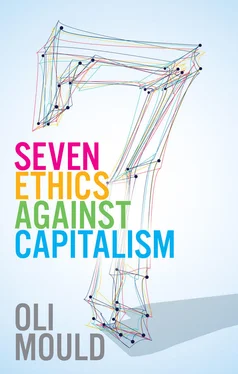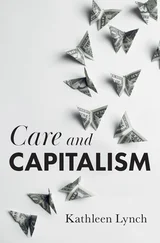Capitalism isn’t working. Over the course of the twentieth century it colonized almost every nation of the globe. Yet, in the first two decades of the twenty-first century, it has hastily ushered in the emergence of growing climate catastrophe on a planetary scale. There is little point in trying to tweak the way capitalism works to be more ecologically sustainable, because its underlying and foundational principle of privatizing the means of production entails the extraction of natural resources to an ever-deepening scale in the all-consuming pursuit of ‘growth’. Capitalism cannot be fixed. The half a millennium or so of rampant imperialist mercantilism, which mutated into a nefarious neoliberal global capitalism and now has morphed into a dangerously fascistic form of nationalistic wealth generation, has proved beyond any reasonable doubt that capitalism does irrevocable damage to the planet, to the climate, to biodiversity and to us as a species.
What is more, all the benefits that supposedly flow from capitalism – creativity, liberty, morality, enlightenment, equality, democracy, wealth and the progress of civilization – are now drying up, and in some cases reversing completely. And more recently, this has been exacerbated. Because the coronavirus pandemic that swept the globe in 2020 rocked capitalism to its very foundations; and it has shown just how much we depend on each other, not capital, for survival. The response to the spread of the virus and the need to keep people ‘locked down’ saw the revival of state-level quasi-socialism on a level barely seen in a generation. There were some of the largest financial bailouts by governments the world has ever seen, to industries and workers. Once bastions of capitalist society such as the US and the UK rapidly implemented policies that were the mainstay of socialist demands, such as rather thinly veiled versions of universal basic income, student debt cancellation, free public services and, of course, the pedestalling of socialized healthcare. The nuances of these are still being implemented, and while a vaccine has been found and the virus will be managed, its impact upon the future of national institutions and indeed society more broadly will be felt far into the future. Because of the impact of the coronavirus, and the now increasing need for governments to act in similar ways to combat the inevitably far bigger crisis of global climate catastrophe, the weaknesses, inefficiencies, inequalities and injustices of capitalism have been vividly exposed.
Yet despite this, the advocates of a capitalist way of life continue to preach that the only way to achieve progress and a better and greener world is to blindly continue along the same path of destruction we have travelled on for so many years. But they are wrong. To tackle the global problems of the future starting with the present climate catastrophe, capitalism needs to be replaced with something else entirely.
But how can this be done? What should replace it? History is littered with revolutionary events, when the oppressed rise up and overthrow their capitalist masters and attempt to install a fairer form of society. But from small-scale, local changes to generation-long episodes of state-led communism, they have all – to a greater or lesser degree – fallen foul of the lure of capitalist dogma that decrees ‘there is no alternative’. This is because in attempting to ‘scale up’ anti-capitalist societies, these revolutionary events have – in one way or another – started to (and in some cases, completely) mirror the injustices of capitalism by invoking the same kind of power imbalances, authoritarianism and inequality, just with a different political economic hue. Their anti-capitalist fundamentals have been lost.
But there is one societal ideology that has remained constant throughout these episodes. From human prehistory, throughout capitalism’s growth, and all those failed revolutions, the very real ideology of the commons has remained. Now, it is an idea whose time has come. But in order for it to aid in the reconstitution of our planet and the healing it requires, we need a planetary commons. This is the coming together of all peoples and resources in the world into a planetary (not global, or international) mode of socio-economic organization that recognizes our material, cultural and psychological intimacy with the planet we inhabit and the human, nonhuman and intangible resources it offers. Planetary thinking embraces the differences of and in the world, and as feminist scholar Gayatri Chakravorty Spivak has argued, it resists the image of the ‘globe’ or globalization as a false totality. 1Practically, then, the planetary commons is a mode of organizing communities, nations and societies that foregrounds the very characteristics that capitalism defenestrates. Solidarity, stewardship, protecting the vulnerable, slowness, and even love; these are some of the ethical ways of being that capitalism diminishes, yet are vital if a planetary commons is to come into view.
Sometimes hidden, the traditional view of the commons has historically – either physically or ideologically – always been a means to subvert, resist and critique the prevailing order of social organization (be that feudalism, fundamentalism, a dictatorship or, today, capitalism). The commons has provided people and communities throughout history with a mode of existence within the cracks of hegemonic societal systems that we are living under. Today, within the cracks of capitalism, a common world is flourishing. 2The commons, as an ideology of human community, has existed in, through and outside of the prevailing order of society for millennia. It has provided societal organizations that are, on the whole, not only ecologically sustainable, but more equitable and just. The commons doesn’t need the creation and exchange of capital to thrive; it only requires the willingness of those who believe in it to succeed.
However, caution is clearly required because the predatory growth of capitalism in the twenty-first century feeds off those forms of life that exist ‘outside’ of it. Appropriating anti-capitalist motifs, 3accumulating by dispossessing, 4and violently enclosing land, societies and ideologies that are not conforming to the mantra of profit-maximization, capitalism thrives off those people, places and experiences that critique it. And via its leading edge of marketing, public relations, advertising and the vernacular of ‘creativity’, capital is created out of the eventual privatization of that which was once held in common. Land, nature, housing, knowledge and even creativity itself have all been wrenched out of common ownership and been carved up and profited from by frontier capitalists. And that which is still common (e.g. the internet, the air we breathe and, now, outer space) is being targeted for privatization and subsequent commercialization.
Therefore to grow the commons to a point at which it is a viable social alternative requires protecting it from enclosure by contemporary forms of capitalism. It requires an active anti- capitalism that is also simultaneously a form of growing the commons, something that political geographers Gibson-Graham call common ing . 5Commoning as a practice by some creates more commons as a resource for us all to benefit from. Despite the voracity of capitalism’s enclosure, there are examples of communities building a commons that is not only resisting this process, but also expanding the more sustainable, just and equitable social organization it creates back into the capitalist world for everyone to share. For example, there are inner-city squats that have resisted enclosure for decades and are now beginning to inform how cities are being built beyond the pure pursuit of profit; community gardening groups that have influenced urban agricultural practice to be more ecologically sustainable; refugee activist groups that have made spaces for people otherwise trafficked and brutally oppressed; climate justice movements that transformed city centres into enclaves of play, theatre and protest and are now shaping national and international policy on climate change; factory workers who have forcibly taken over the management structure to make it more equitable for all workers; and, in the wake of the coronavirus, mutual aid networks that have sprung up all over the world to help deliver food to the isolated, care for the sick, and educate and entertain locked-down children.
Читать дальше












